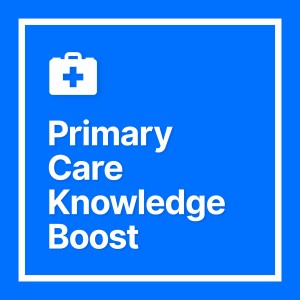
Wednesday Nov 30, 2022
Vertigo
Doctors Lisa and Sara talk to Consultant Otolaryngologist Ms Emma Stapleton and Clinical Scientist David Jay about Vertigo. We discuss the definition, differentials, and how to use information around timing and triggers to differentiate between the likely causes of vertigo. We get their take on the important details in the examination that can help identify the diagnosis, and talk options for managing the most common types of peripheral vertigo.
The resources section of the episode description contains excellent resources to help, including examples of how to perform and interpret the Head Impulse test, as well as vestibular rehabilitation resources for patients.
You can use these podcasts as part of your CPD - we don’t do certificates but they still count :)
Useful resources:
-
HINTS to diagnose stroke in the acute vestibular syndrome: three-step bedside oculomotor examination more sensitive than early MRI diffusion-weighted imaging. Kattah JC, Talkad AV, Wang DZ, Hsieh YH, Newman-Toker DE . Nov 2009, Stroke: https://pubmed.ncbi.nlm.nih.gov/19762709/
-
A summary of HINTS by David Jay: Developments in diagnostic approaches for acutely dizzy patients: (Feb 2020 ENT & Audiology News): https://www.entandaudiologynews.com/features/audiology-features/post/developments-in-diagnostic-approaches-for-acutely-dizzy-patients
-
TiTrATE: A Novel Approach to Diagnosing Acute Dizziness and Vertigo. Newman-Toker and Edlow J A. Neurology Clinics (Aug 2015) https://www.ncbi.nlm.nih.gov/pmc/articles/PMC4522574/
-
The Five Deadly D’s of Dizziness (red flags to remember): EM Resident, Unravelling the Mystery of Dizziness in the ED: A Guide for the Student Clerkship, Oct 2018 Wilcox K, Shafer K: https://www.emra.org/emresident/article/dizziness/
-
BMJ Vertigo: Dix-Hallpike Video: https://www.youtube.com/watch?v=8RYB2QlO1N4
-
BMJ Vertigo: Epley Manoeuvre Video: https://www.youtube.com/watch?v=jBzID5nVQjk&t=44s
-
Examples of how to perform the Head Impulse Test for Peripheral Vestibular Dysfunction:
https://www.youtube.com/watch?v=psyPED6anPo
https://www.youtube.com/watch?v=XpghlvnrREI
-
Professor Lucy Yardley: Retraining your Balance: https://www.menieres.org.uk/files/pdfs/balance-retraining-2012.pdf
-
VeDA Vestibular Disorders Association USA Resources for Clinicians and Patients:
Main Page: https://vestibular.org/ -
VeDA Vestibular Disorders Association USA Resources for Clinicians and Patients:
Type of Vestibular Disorders Page: https://vestibular.org/article/diagnosis-treatment/types-of-vestibular-disorders/ -
Meniere’s Society UK: https://www.menieres.org.uk/
-
The Migraine Trust: https://migrainetrust.org/
___
We really want to make these episodes relevant and helpful: if you have any questions or want any particular areas covered then contact us on Twitter @PCKBpodcast, or leave a comment on our really quick anonymous survey here: https://pckb.org/feedback
___
This podcast has been made with the support of GP Excellence and Wigan CCG. Given that it is recorded with Greater Manchester clinicians, the information discussed may not be applicable elsewhere and it is important to consult local guidelines before making any treatment decisions.
The information presented is the personal opinion of the healthcare professional interviewed and might not be representative to all clinicians. It is based on their interpretation of current best practice and guidelines when the episode was recorded. Guidelines can change; To the best of our knowledge the information in this episode is up to date as of it’s release but it is the listeners responsibility to review the information and make sure it is still up to date when they listen.
Dr Lisa Adams, Dr Sara MacDermott and their interviewees are not liable for any advice, investigations, course of treatment, diagnosis or any other information, services or products listeners might pursue as a result of listening to this podcast - it is the clinicians responsibility to appraise the information given and review local and national guidelines before making treatment decisions. Reliance on information provided in this podcast is solely at the listeners risk.
The podcast is designed to be used by trained healthcare professionals for education only. We do not recommend these for patients or the general public and they are not to be used as a method of diagnosis, opinion, treatment or medical advice for the general public. Do not delay seeking medical advice based on the information contained in this podcast. If you have questions regarding your health or feel you may have a medical condition then promptly seek the opinion of a trained healthcare professional.
No comments yet. Be the first to say something!